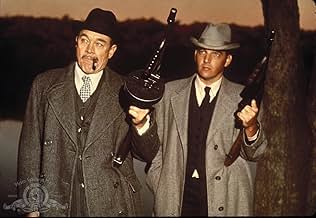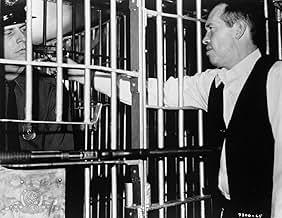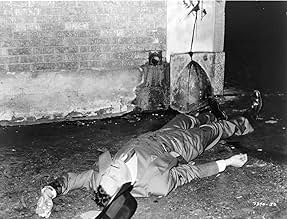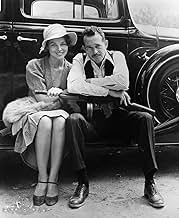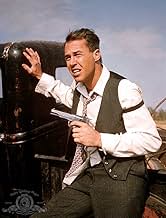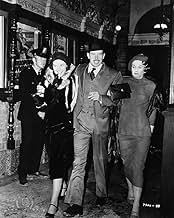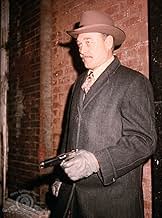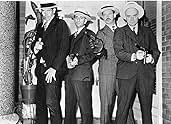John Dillinger and his gang go on a bank robbing spree across the midwest, but one G-Man is determined to bring him down.John Dillinger and his gang go on a bank robbing spree across the midwest, but one G-Man is determined to bring him down.John Dillinger and his gang go on a bank robbing spree across the midwest, but one G-Man is determined to bring him down.
- Awards
- 1 nomination
John P. Ryan
- Charles Mackley
- (as John Ryan)
David Dorr
- Leroy
- (uncredited)
Roland Bob Harris
- Ed Fulton
- (uncredited)
George O. Heath
- John Dillinger, Sr.
- (uncredited)
J. Edgar Hoover
- Self (post-end credits speech)
- (voice)
- (uncredited)
- Director
- Writer
- All cast & crew
- Production, box office & more at IMDbPro
Storyline
Did you know
- TriviaJ. Edgar Hoover protested this film being made and demanded that changes be made to the script to depict the FBI in a better light (see below). Shortly before his death he recorded a disclaimer to the film; it can be heard (spoken by an imitation voice) after the closing credits. The film depicts John Dillinger being shot outside the Biograph after he pulls his gun; in fact, Dillinger never pulled a gun that night. The FBI decided they were going to kill Dillinger rather than attempt to take him alive; they announced their presence, he turned to run, and was shot six times in the back.
- GoofsNotes at the end of the movie claim that Melvin Purvis shot himself with the gun he killed John Dillinger with. In fact, the gun used to self-inflict his fatal wound was given to him by his colleagues at the FBI when he retired in 1935, the year after Dillinger was shot.
- Quotes
[repeated line]
Homer Van Meter: Goddamit! Things ain't workin' out for me today!
- Crazy creditsAfter the closing credits a verbal renouncing of gangster films written by FBI chief J. Edgar Hoover is heard: he was scheduled to read it for the film, but died before it started production. Hoover's text is read at the film's close by voice actor (Paul Frees) decrying the film and calling it a source of corruption for children.
- Alternate versionsTwo different versions with different main title music exist_ The original version features the song "We're in the Money" being played while snap shots of homeless and poor people are shown on the screen. The alternate version has the same visuals but with a simpler instrumental cue (called "Theme from Dillinger" on the soundtrack LP).
- ConnectionsFeatured in Breakaway (1990)
- SoundtracksThe Gold Diggers' Song (We're in the Money)
(uncredited)
Music by Harry Warren
Lyrics by Al Dubin
Sung during the opening credits
Featured review
This is still the definitive biography of John Dillinger on film. I just saw Mann's Public Enemies - this film blows that one away. Forgive me for quoting my own review of Mann's film:
"Milius, taking his cue from "Bonnie And Clyde," from the earlier Lawrence Tierney film "Dillinger," and from the gaudy gangster films of Roger Corman, fashioned a film that was both flashy yet homespun, part unabashed B-movie, part evocation of American Gothic. Even his occasional tinkering with historical accuracy could be forgiven, since it was clear he had a firm grasp on what the Dillinger phenomenon was really all about - 'farm boy makes good by turning bad' is an undeniable folk-theme of American life. And the brilliance of Warren Oates' performance in the Milius film is that Oates plays Dillinger like a runaway farm-boy with a sense of humor and a quick temper, who just happened to rob banks for a living. That's as much as you can give any professional criminal without lying about the nature of crime namely, it's about stealing other peoples' money and hurting many of them in the process."
Other reviewers have remarked this as a B-movie - but it is intentionally so, it never makes any pretense otherwise; and that's important: having decided to make a B-movie leaves Milius with considerable leeway as to how far he wants to push any aspect of the material. So while it's hard to think of any particular dramatic high-point of the film (perhaps the scene where Dillinger and Purvis go to the same restaurant, or the death of Pretty Boy Floyd?), it's much harder to find any moment that really drags the film down - the pacing of the film is that of a B-movie, it moves! There's nothing exceptional about the cinematography or music, or production design; what we're left with are memorable performances by some of the greatest character actors in cinema at the time, and an exciting story with enough savvy to trigger our emotions.
Milius watched the Lawrence Tierney "Dillinger" and learned from it before starting this film; Mann should have watched Milius' film over and over before starting "Public Enemies." In any event, this is still THE Dillinger story, and and an entertaining action film as well.
"Milius, taking his cue from "Bonnie And Clyde," from the earlier Lawrence Tierney film "Dillinger," and from the gaudy gangster films of Roger Corman, fashioned a film that was both flashy yet homespun, part unabashed B-movie, part evocation of American Gothic. Even his occasional tinkering with historical accuracy could be forgiven, since it was clear he had a firm grasp on what the Dillinger phenomenon was really all about - 'farm boy makes good by turning bad' is an undeniable folk-theme of American life. And the brilliance of Warren Oates' performance in the Milius film is that Oates plays Dillinger like a runaway farm-boy with a sense of humor and a quick temper, who just happened to rob banks for a living. That's as much as you can give any professional criminal without lying about the nature of crime namely, it's about stealing other peoples' money and hurting many of them in the process."
Other reviewers have remarked this as a B-movie - but it is intentionally so, it never makes any pretense otherwise; and that's important: having decided to make a B-movie leaves Milius with considerable leeway as to how far he wants to push any aspect of the material. So while it's hard to think of any particular dramatic high-point of the film (perhaps the scene where Dillinger and Purvis go to the same restaurant, or the death of Pretty Boy Floyd?), it's much harder to find any moment that really drags the film down - the pacing of the film is that of a B-movie, it moves! There's nothing exceptional about the cinematography or music, or production design; what we're left with are memorable performances by some of the greatest character actors in cinema at the time, and an exciting story with enough savvy to trigger our emotions.
Milius watched the Lawrence Tierney "Dillinger" and learned from it before starting this film; Mann should have watched Milius' film over and over before starting "Public Enemies." In any event, this is still THE Dillinger story, and and an entertaining action film as well.
- How long is Dillinger?Powered by Alexa
Details
- Release date
- Country of origin
- Languages
- Also known as
- Jagd auf Dillinger
- Filming locations
- Oklahoma City, Oklahoma, USA(Nightclub for Purvis engagement party; Purvis meets lady in red; Biograph Theater scene where Dilliger dies)
- Production company
- See more company credits at IMDbPro
Box office
- Budget
- $1,000,000 (estimated)
- Runtime1 hour 47 minutes
- Color
- Aspect ratio
- 1.85 : 1
Contribute to this page
Suggest an edit or add missing content



